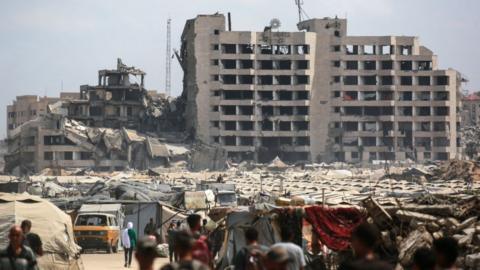Israel’s Gaza Escalation: When Strategy Becomes a Hostage Situation
Hello everyone. Today we’re diving headfirst into the political equivalent of stepping on a rake over and over again – the Israeli government’s latest grand plan for Gaza. Apparently, Prime Minister Netanyahu has decided that the best way to handle the hostage crisis is to… escalate militarily. Yes, because history totally shows that more bombs always bring people home faster. And by “always,” I mean “literally never in the way you think.”
The families of the hostages – you know, the actual people with the most skin in the game – have taken one look at the plan and said, “You’ve got to be kidding me.” The Hostages and Missing Families Forum has accused the government outright of abandoning their loved ones. Their words, not mine: “By choosing military escalation over negotiation, we are leaving our loved ones at the mercy of Hamas.” Harsh? Sure. Accurate? Also sure.

From Negotiation to “Nuke ‘Em from Orbit”
The decision was apparently reached after a mere ten hours of a security cabinet meeting. Ten hours! Politically speaking, that’s about the same as an endurance dungeon raid with no healer – everyone’s exhausted, and eventually someone just shouts “Screw it, YOLO!” The result? Military escalation. Because nothing says “humanitarian priorities” like choosing a route that every poll suggests your population hates.
Meanwhile, outside Netanyahu’s office, protesters were chaining themselves together, presumably because smashing one’s forehead against a brick wall did not seem symbolic enough. Parents of hostages, like Anat Angrest, weren’t mincing words either: “You have failed.” Cold, sharp, and surgical – much like a doctor telling a patient their MMORPG addiction has eaten their liver.
Fifty Hostages, Twenty Lives, and One Colossal Gamble
Right now, we have fifty known hostages, twenty of whom are believed to still be alive. Let that sink in before we place bets on whether dropping artillery shells nearby helps these numbers go up or down. Spoiler: it’s the latter. Yehuda Cohen, whose son is in captivity, bluntly called the decision “endangering my son and other living hostages.” Translation: Netanyahu might be rolling the dice here, but it’s not his family’s lives at stake – it’s someone else’s characters getting permadeath.
“It is endangering the hostages and prolonging their suffering.”

Public Opinion? More Like Public Revolt
Tal Schneider from the Times of Israel summed it up: there’s a “huge public backlash.” That’s journalist-speak for “Netanyahu’s approval rating just found a new basement level.” And according to polls, the public is overwhelmingly against this step – which means the government’s playing on hardcore mode with perma-stealth, ignoring the mini-map entirely.
Voices from Tel Aviv aren’t any kinder. Hotelier Danny Bukovsky called the escalation “a death sentence to all the hostages” and insisted negotiations must come first. Talya Saltzman took the same route: destroy Hamas later if you must, but get the hostages back now. Radical notion, isn’t it? Prioritizing human lives before ticking off a decades-old “defeat Hamas” quest objective.
The Bigger Picture? It’s a Mess
Let’s be blunt – this is textbook tunnel vision. The goal of eliminating Hamas is, in principle, a solid long-term aim for Israeli security. But deciding to do it at this exact moment, with hostages in the line of fire and public opinion screaming “Don’t,” is the political equivalent of a surgeon amputating the wrong leg because they wanted to finish before lunch.
What we’re seeing here is a leadership doubling down on a strategy that’s less about precision and more about “press all the buttons, hope for the best.” And that kind of thinking doesn’t just cost votes – it risks lives in a way that’s both obvious and avoidable. In gaming terms, this is going for the boss fight without reviving your party or refilling your health potions. Good luck with that.
Conclusion: Deadly Gambles Aren’t Strategy
In the end, this policy is less “masterstroke of military tactics” and more “reckless bet with human lives as chips.” When the families of those lives are telling you – loudly and in unison – that your plan is a disaster, maybe the smart move is to listen. But that would require humility, patience, and a priority list that puts people before political posturing. Sadly, this government seems to be running an entirely different meta.
Overall impression? Bad. Catastrophically bad. The kind of decision-making that guarantees neither strategic victory nor moral high ground, just a lot of unnecessary pain.
And that, ladies and gentlemen, is entirely my opinion.
Article source: Taking control means abandoning hostages, families say, https://www.bbc.com/news/articles/c2061vn1mvyo



